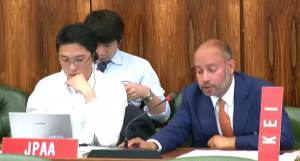On Monday, 9 July 2018, Knowledge Ecology International (KEI) made the following statement on exceptions and limitations to patent rights.
KEI made the following proposal:
In terms of future work on this item on exceptions and limitations to patent rights, we propose that the Committee request the WIPO Secretariat to conduct a study on the implications of Article 27.3(a) of the TRIPS Agreement on the patentability of gene and cell-based therapies including those involving autologous T-cell immunotherapy (CAR T), CRISPR and other technologies when treatment can be described as a service or a medical procedure, rather than a product.
9 July 2018
Statement of Knowledge Ecology International
Agenda item 5 – Exceptions and limitations to patent rights
KEI welcomes the publication of the Second Draft of WIPO’s Reference Document (SCP28/3) on the Exception Regarding Acts for Obtaining Regulatory Approval from Authorities. The document provides a detailed overview of the policy objectives that engendered the creation of the regulatory review exception and a comprehensive insight into its application in over 65 countries. Importantly, it also describes the challenges faced by countries in its implementation.
The reference document cites a study produced for the European Commission which estimated that the “extension of the regulatory review” exception to “cover any medicines and marketing authorizations in any country would benefit the European pharmaceutical industry by reducing legal costs, such as freedom-to-operate (FTO) studies, validity opinions, patent oppositions and costs of infringement proceedings. In particular, the study estimates, inter alia, that cost savings from FTO studies could amount between €23-€34.3 million per year.” The study also noted the “cost savings of not having to run clinical trials in four additional countries would be €2.6 million to €4.4 million per case.”

In terms of future work on this item on exceptions and limitations to patent rights, we propose that the Committee request the WIPO Secretariat to conduct a study on the implications of Article 27.3(a) of the TRIPS Agreement on the patentability of gene and cell-based therapies including those involving autologous T-cell immunotherapy (CAR T), CRISPR and other technologies when treatment can be described as a service or a medical procedure, rather than a product.
We would note that Article 27.3(a) states:
“3. Members may also exclude from patentability: (a) diagnostic, therapeutic and surgical methods for the treatment of humans or animals.”
Such a study could evaluate the relationship between autologous T-cell immunotherapies such as tisagenlecleucel (TN Kymriah) or axicabtagene ciloleucel (TN Yescarta), the first two chimeric antigen receptor T-Cell (CAR T) treatments approved by the United States FDA, or voretigene neparvovec (TN Luxturna), a novel in vivo gene therapy for the treatment of congenital blindness (Leber’s congenital amaurosis), and a national exception to patentability, under TRIPS Article 27.3(a).
The study should determine if certain cell and gene based treatments are in fact, exempt from patentability when a country has an exception that mirrors Article 27.3(a), and also discuss non-patent approaches to providing incentives to invest in innovations for such treatments, such and innovation inducement prize funds and market entry rewards (MERs), that delink R&D costs from prices and monopolies on the medical technologies.